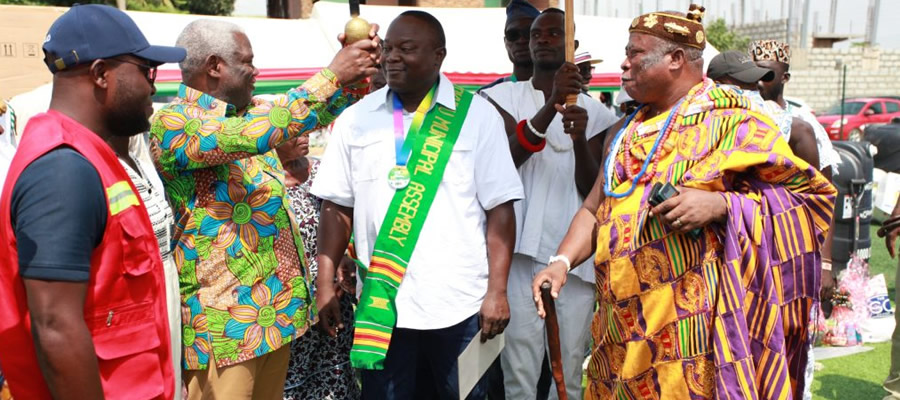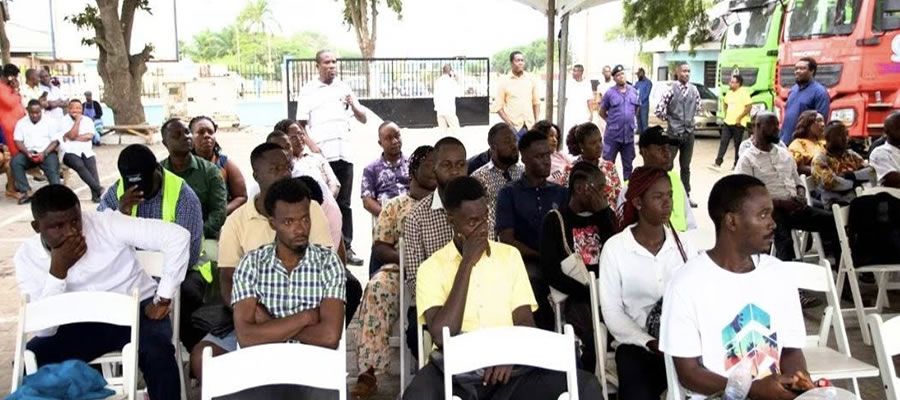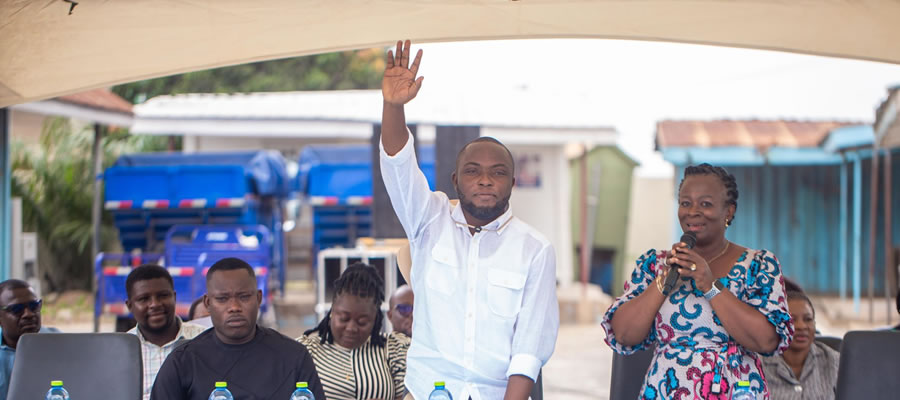

POCC
Potentials, Opportunities, Constraints & Challenges
Based on the assessment of the issues raised during analysis of the Municipal Profile and Community Needs and Aspirations, a further exercise was conducted to ascertain the Potentials, Opportunities, Constraints and Challenges of the Municipality. These have been classified under the three pillars of the Growth and Poverty Reduction Strategy (2) in line with National Development Planning Guidelines; Private Sector Competiveness, Human Resource Development, Good Governance and Civic Responsibility.
Municipal Finance
The Municipal Assembly is governed by certain financial regulations rooted in Article 245 and 252 of the 1992 Constitution and Section 34 of the Local Government Law 1993, Act 462 which at various sections indicate the types and nature of transfers that central government has to make as well as the revenue sources of the Assemblies. They include Recurrent Expenditure Transfers, District Assembly Common Fund and Special Transfers and Internally Generated Funds.
Recurrent Expenditure Transfers
Under this funding source, the Government of Ghana assumes full responsibility to handle the payment of salaries and other remuneration, including pensions of staff, provided these fall within manpower ceiling of the Assembly.
District Assembly Common Fund (DACF)
This is another Central Government transfer which has been a very important revenue source for a new Municipality such as the Ledzokuku Municipal and has served to provide the basis for key administrative infrastructural interventions for the new Assembly. The fund is based on Article 252 of the 1992 Constitution of the Republic of Ghana which makes a provision for District Assemblies to benefit from a District Assembly Common Fund which shall be;
Allocated annually by Parliament not less than five (5%) percent of the total revenues of Ghana and payable in quarterly installments for development;
Distributed among District Assemblies on the basis of a formula to be provided by parliament
Administered by a District Assemblies Common Fund administrator
Act 455, which establishes the DACF defines the “total revenue of Ghana” for this purpose to mean “all revenue collected by or accruing to the central government other than foreign loans, grants, non-tax revenue and revenues already collected by or for D/As under any enactment in force”.
The object of the Common Fund is to make available to the D/As additional resources for development.
Section 9 of Act 455 states that “the Minister responsible for Finance in consultation with the Minister (responsible for Local Government), shall determine the category for expenditure of the approved development budget of the D/A that must in each year be met out of amounts received by the Assembly from the Fund.
The DACF is also disbursed based on guidelines developed in line with prevailing government policies.
Special Transfers
These include other transfers from the Central Government apart from the Common Fund. This may include Stool Land Revenue or other funding that the Municipality may enjoy based on government policy.
Internally Generated Fund (IGF)
In line with the aim of ensuring autonomy of the various MMDAs to give meaning to the current decentralisation policy of the nation, the Assemblies are empowered to collect their own revenue. In deed this is expected to constitute the main revenue of the Assembly while Central Government Transfers are provided to supplement the efforts of the Assembly in revenue generation. These revenue sources comprise:
Rates: Included under this revenue are;
Basic rates (poll tax): It is a kind of tax which is levied on every adult between 18 and 70 years of age
Property rates (Landed property owners): It is levied on landed properties in the area of authority of the Ledzokuku Municipality. This source of revenue is the most important
Special rate: These are rates imposed by Ledzokuku Municipal through fee-fixing resolutions to raise funds for specific projects.
Fees: The Assembly under section 34 of Act 462, have the authority to levy fees on a range of items. Some of the fees are on slaughterhouses, market dues; market stalls, trading kiosks etc.
Licenses: The Assembly is assigned to raise revenue from issuance of licenses from host of items and activities. They include dog licenses, extension of hours, hotels and restaurants, beer and wine sellers, petroleum installations, lorry parks overseers, self-employed artisans.
It should however be mentioned that in line with the 1992 Constitution, Central Government still reserves the right to collect certain taxes in the MMDAs. Some of the important ones include; Income Tax, Value Added Tax, Import and Export Taxes and Excise Duties.
Comparism of External Grants and Internally Generated Funds
As at 31st December of 2008, it was realised that 21% of revenue was derived from Assembly’s own resources while the remaining 79% were from external sources. It is clear that there is a heavy reliance on external support for the various projects and activities embarked upon. This situation is expected from a new municipality like Ledzokuku Municipal but it is envisaged that in the long term internal funds shall be enhanced to give meaning to the financial autonomy that the Assembly seeks.
Financial Institution
Banking
In view of the strategic location of the Municipality in the Greater Accra Region and more still its specific location between the national capital, Accra and Tema, the second largest city in the Greater Accra Region; Ledzokuku Municipal is well placed to attract large investment concerns for its economic development due to the prevailing economic climate in the region. The Municipality is therefore gradually assuming the role of an emerging commercial centre.
Among other factors, this is due to the internal economic opportunities that the Municipality provides as well as rising cost and scarcity of economic land within the large cities thereby shifting concentration to neighbouring areas like Ledzokuku Municipal. Consequently the Municipality is now gradually taking its place as an important economic zone for commerce, manufacturing and finance, third after Accra and Tema. Other sectors such as tourism are yet to be developed to their full potential.
In other to facilitate the economic growth of the Municipality, management of the Assembly appreciates that the process of planning for the general development of the economy must of necessity involve broad guidelines and incentives to drive the private sector to both municipal and nationally desired aspirations.
This entails close and transparent partnerships between the public sector and formal and informal private sectors so that problems can be identified and addressed pragmatically to ensure that the path of the entrepreneurs are facilitated and smoothened. Issues to be considered in this regard include quick permitting procedures and infrastructural provision to enhance businesses.
Home Finance Mortgage
Bank and numerous Foreign Exchange Bureaux
These financial institutions together with strings of shops, restaurants, large scale industrial establishments and other commercial concerns which make up the formal economy are usually located on the Spintex Road, making it the most important commercial zone in the Municipality.
The next commercial zone along the Teshie-Nungua Road, although important is however not up to the status of the Spintex Road in terms of socioeconomic infrastructure.
The importance of these road corridors and their adjoining businesses created through injection of private capital enhances the economic value of land in these areas and the Assembly is expected, among other interventions, to enhance the spatial environment of these businesses through infrastructural improvement and landscaping to further upgrade the land value in these areas as a basis for charging economic rates.
In reality however these areas lack the necessary infrastructure in terms of pavements, landscaping etc and the few cases of such interventions are done by the companies themselves. Consequently there is sometimes poor sanitation reflected in choked drains and unkempt environment. Other problems of the formal economy include land litigation
The formal private sector institutions Nevertheless, these institutions operate in the formal sector leaving the informal economy with no financial institutional structures.
Date Created : 11/20/2017 8:18:13 AM












 facebook
facebook
 X
X
 Youtube
Youtube
 instagram
instagram
 +233 593 831 280
+233 593 831 280 0800 430 430
0800 430 430 GPS: GE-231-4383
GPS: GE-231-4383 info@ghanadistricts.com
info@ghanadistricts.com Box GP1044, Accra, Ghana
Box GP1044, Accra, Ghana